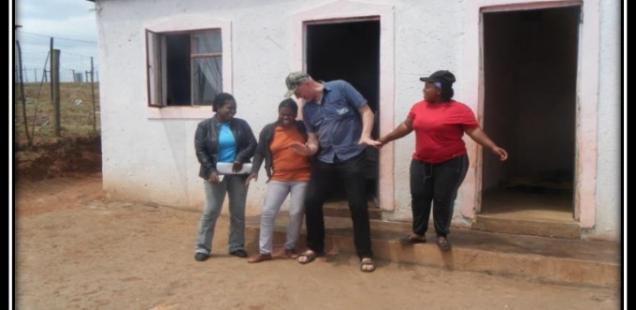
SACBC AIDS Office AIDS Office Annual Report 2016
Sr Alison Munro
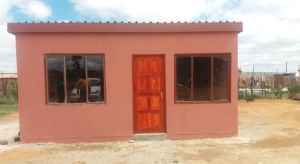
OVC PROGRAMME
The OVC Programme has been supported by three PEFPAR District Partners since October 2015, i.e. Aurum, Health Systems Trust and Beyond Zero. From October 2016, a fourth PEPFAR partner was added, TBHIV Care, which will in 2017 replace Beyond Zero.
We had to withdraw from operating in certain districts and dioceses because of priorities set by the Department of Health and by PEPFAR, but have also had to expand services in priority districts to include additional projects. There has been an expansion in Bojanala (parts of Rustenburg and Pretoria Dioceses), Ngaka Modiri Molema (parts of Kimberley Diocese), Ekurhuleni (parts of Johannesburg Archdiocese), and City of Cape Town. We have now also been requested to expand in Amathole and Buffalo City (parts of the Dioceses of Port Elizabeth and Umtata).
At the same time some budgets have been reduced which will demand a particular control over what services can be funded. Broadly the programme covers HIV testing and TB screening services, educational support, HIV prevention education, psychosocial support.
Catholic Relief Services (CRS) and some other small Catholic funders have also supported OVC services in Swaziland and elsewhere. CRS will again support the programme in 2017, having awarded a new small project grant towards the end of 2016.
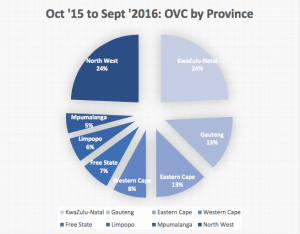
TREATMENT ADHERENCE PROGRAMME
Our Global Fund OVC and treatment adherence programme through NRASD ended in March, and the second part of the year under a new District Partner, Right to Care, the new treatment adherence programme got off to a slow start in Ekhuruleni, City of Johannesburg and Enhlanzeni districts. There were ongoing challenges with the Department of Health in the identified districts and with our partner around where the programme could and will operate and what is expected (i.e. in which clinics, target numbers of patients, budget allocations, etc). We did however manage to report statistics on particular indicators.
The programme supports people who are stable on treatment through support groups and at drug pick up points. It aims to make provision for patients not to have to queue for long periods when they pick up drugs and at the same time to help ensure they remain adherent on treatment. Facilitators work both in the clinics concerned where space is available and at a number of Church facilities.
ORPHAN HOUSING PROGRAMME
The housing programme which supports simple two roomed houses in rural areas for child-headed and grandparent headed households has been operational since mid-2010, and has now provided over 500 houses to poor families.
Homeplan, a Dutch NGO, has been at the forefront of the programme since 2010 and committed in 2016 to funding the building of 55 new houses. Their programme supported the building of houses in the dioceses of Tzaneen, Dundee, Manzini, Pretoria, with other funding supporting the building of houses in the Dioceses of Mariannhill and Durban. At the end of November a researcher completed a visit to most places where Homeplan has provided houses over the past 6 years and completed an evaluation of the impact of the completed buildings on the lives of beneficiary families. The evaluation provided a report of the positive impact of houses on the lives of people and helpful recommendations to Homeplan about possible improvements to how helpful additions can be made in the future.
German private donors and Misereor sponsored some houses in the dioceses of Durban and Mariannhill. The Misereor funding also provided training in basic building to orphaned and other youth in Mariannhill.
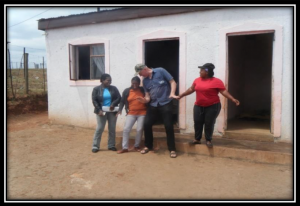
FLEISZER LEGACY
The Fleiszer Legacy, received through Christian Aid , which was managed by the SACBC AIDS Office over a three year period in “support of the poor of Johannesburg” was due to end in December. It supported Catholic projects in Pretoria and Johannesburg Archdioceses. Some of these work with the elderly, with children, with physically and mentally disabled youth and adults, with those in drug rehabilitation, and with families in squatter settlements. In December it was confirmed that some additional funding would continue to support the projects concerned until the end of April 2017.
AIDS DATA SYSTEM
One of the PEPFAR partners was able to provide the funding for the rewriting of our electronic data system; the first phase of the new system had neared completion by the end of 2016. Parts of it were tested with SACBC staff and 9 pilot sites in November, ahead of the proposed launch at all the sites in early 2017. Each participant will work with real data pertaining to their own sites. The rewrite had become necessary because of the numerous changes called for by PEPFAR and other funders regarding the indicators on which they wanted reports. The developers, at the request of the SACBC AIDS Office tried to ensure that from a user point of view the new system, the AIDS Data System (ADS) is not too different from the electronic database being replaced; at the same time they have been requested to ensure that it can provide all that is required by donors. The developer of the new AIDS Data System will continue as part of the contract to provide technical support to the SACBC AIDS Office.
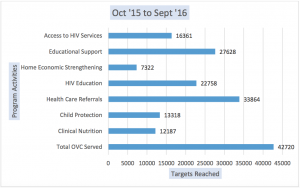
CONFERENCES, TRAINING, RETREATS
The AIDS Office was the local organiser, with CATHCA, in South Africa of the Catholic Pre Conference held in Durban ahead of the International AIDS Conference in July. Representatives from Church projects across the region made up over half of the number of participants, with good representation from the bishops and from organisations affiliated to Caritas Internationalis. The AIDS Office was able to sponsor some staff members and some AIDS project representatives to attend the International AIDS Conference. Both conferences provided a good opportunity to receive updated information and guidelines on a variety of topics. Most sobering was the information around the increasing vulnerability of youth, and in particular adolescent girls and young women, to HIV infection.
Staff have also attended various conferences and trainings associated with the particular grants being implemented, and provided on-site training to project personnel at different times. The Families Matter! training for parents/guardians of children entering puberty was highly appreciated, though there were some challenges in Cape Town in particular, some of them related to local social issues. Project staff were also trained in some districts in HIV counselling and testing. Once accredited with the clinics in their areas, they are able to provide counselling and testing for children in their programmes. Where possible the AIDS Office was also able to support a number of retreats for personnel of different projects.
STAFFING
The current staffing number was 18 across all programmes. New appointments were made from October 2015 when funding was renewed and programmes increased, and to replace some staff who had resigned, and again in 2016. The plan is to take on a deputy director in 2017. There were challenges with some staff related to sickness and to family problems, but overall we experienced good relationships and a good working environment.
FINANCE
The audited financial statement for the calendar year January to December 2016 forms part two of this report. The AIDS Office was able to submit the 2015 PEPFAR audit to the US authorities and to the PEPFAR partners. Because the audit is large, our auditors also recently completed half of the 2016 audit to make their work easier when the 2016 financial year is complete
APPENDICES
1. ORPHAN AND VULNERABLE CHILDREN 2016
Aims of the Project
The SACBC AIDS Office OVC program operates in 30 districts, in eight provinces in South Africa. Underpinning the response are the principles of Catholic Social Teaching which recognize the dignity of every human being, the sanctity of life and solidarity. The OVC activities provided are aligned to the National Strategic Plan. The aim of the project is to ensure that all the SACBC AIDS Office funded projects prioritize the 90 90 90 UNAIDS strategy, encourage all the sites funded to do HIV/AIDS testing, refer all the clients tested HIV positive to the local clinics for treatment, ensure that all HIV positive clients adhere to the treatment; screen for TB symptomatic and refer TB suspects to the local clinic; equip the OVC guardians with good parenting skills; strengthen HIV education and maximize improvement in the well-being of vulnerable children in the epidemic. OVC programmes aim to prioritize psychosocial interventions that assist children to grow up in stable and affectionate environments. OVC programs aim to develop appropriate strategies for preventing and responding to child abuse, exploitation and violence, through integrating child protection activities and supporting communities to prevent and respond to child protection issues.
Achievements in 2016
- HIV COUNSELLING and TESTING (HCT)
Most sites have managed to create good relationships with the HCT partners in their districts. A lot of HCT campaigns had been carried out in different districts. Ngaka Modiri Molema district sites work closely with Lifeline Mafikeng in executing HCT and in Ekurhuleni sites worked with Shout It Now on HCT campaigns and road shows. Aurum has trained care workers in these districts: 46 child care workers in Ngaka Modiri Molema District, 19 in Bojanala and 20 in Ekurhuleni district. The total number of people tested: 15165 children and 3108 guardians were reached through the HCT campaigns in 2016.
- FAMILIES MATTER! PROGRAMME (FMP)
A total of 450 guardians in Lejweleputswa district received the FMP training. The training was facilitated by the Health Systems Trust (HST) facilitators. The main aim of the training was to improve communication between parents and their children on issues of sex and sexuality, thereby helping children to make good choices for their lives, which will in turn make sure that they are HIV free. The FMP training targeted OVC programme guardians and guardians in the community with children between the ages of 9 and 12 years old. The duration of the training was 6 weeks. 295 guardians in Ngaka Modiri Molema district and 504 guardians in Bojanala district completed the FMP training. The training was facilitated by Aurum facilitators. In the City of Cape Town 62 guardians completed the FMP training and in Ekurhuleni 850 guardians completed the FMP training.
Testimonies were received from guardians in all districts where FMP has taken place on the impact the programme has had on their lives, and how relationships between guardians and children have been improved through this programme.
Challenges faced by the SACBC AIDS Office
HIV/AIDS stigma is still a big challenge which results in voluntary testing remaining a challenge, high numbers of beneficiaries defaulting on ARV treatment which leads to unnecessary deaths, and local clinics not reaching out to all the clients that need to be tested for HIV. Families Matter! Programme had to be offered in local languages so that all guardians could be accommodated. The challenge was that manuals could not be secured immediately in all local languages leading to tension and awkwardness in class between facilitators and participants while the culture of silence around sex and sexuality was being broken.
2. THE GLOBAL FUND – Implemented under the National Religious Association for Social Development (NRASD), and under Right to Care
This report covers the work done with Global Fund support through NRASD (until March 2016) and Right to Care (from July 2016). The sites through which implementation was done under NRASD were Ahanang HBC & OVC; Kurisanani HBC in Phalaborwa; Motupa & Mokgolobotho; Vezokuhle HBC & OVC and Tiyimiseleni OVC.
The aims of the project
The project was aimed at supporting people infected and affected by AIDS with the focus on Treatment Adherence Support for adults and HIV Testing and Counselling for adolescents as well as psychosocial and educational support for OVC (Orphans and Vulnerable Children).
Targets
Treatment Adherence Targets (NRASD): 7776; Actual numbers of patients reached: 7873 (targets exceeded by 97). OVC Support Targets: 11520; Actual number of orphans reached: 11709 (targets exceeded by 189). HCT targets: 616, actual numbers of children tested: 1116 (target exceeded by 500)
All targets for the NRASD grant were met and exceeded by March 2016 as indicated above.
The current targets are based on the 90/90/90 strategy and the overall target given by Right to Care for the GF adherence programme (2016-2019) is 70,000 patients.
Achievements in 2016
All targets were exceeded for the NRASD Global Fund program. NRASD program closed successfully and SACBC AIDS Office managed to secure more funding for the Adherence Programme through Right to Care.
18 clinics in 3 Municipal Districts (City of Johannesburg; Ehlanzeni and Ekurhuleni) have been successfully engaged and are due to start facility and community adherence clubs, which will also help with clinic decongestion under the SACBC Right to Care Programme.
Challenges in implementing the Global Fund Programmes
When the NRASD Global Fund grant ended, the ground work that was started in Limpopo to establish adherence clubs fell apart as there was no funding to support it under current funding. The Right to Care grant was circumscriptive and would not allow SACBC AIDS Office to continue with the work that was already started under NRASD in Sedibeng District; Ehlanzeni and Mopani as either the clinics or the entire districts did not fall within the project scope. The OVC programmes that could be absorbed into other programmes were transferred to those programmes but others fell by the wayside.
3. HOUSING AND COMPUTER SCHOOLS
We continue to try and address the socials ills in the communities that we are serving by alleviating poverty and ensuring that our beneficiaries have a roof over their head which is paramount for human dignity. We have built houses as shown below, some of them belonging to 2015 grants but not completed in 2015.
Homeplan funding also allowed for the completion of the last of the 3 computer schools (utilising existing buildings and beautifully refurbished) and the support of the activities of the computer schools.
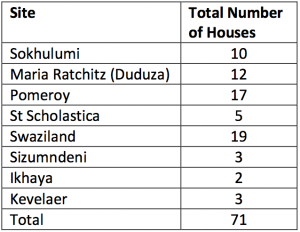
Aims
- To provide shelter to orphans and poor families
- To empower youths through skills development (computer skills, basic buildingskills)
- To help youth become employableTarget Group
- Orphans and guardians, and families living in overcrowded shacks
- Computer schools target youth who have completed matric and have not proceeded toTertiary Institutions, as well as school drop outsAchievements
- Houses have been built for poor and orphaned children and their guardians
- Water tanks have been provided
- Pit latrines have been built
- Computer schools have been registered with the international Board ICDLChallenges
- Struggles with internet
- Huge distances to transport the building materials from the supplier to the sites
- Inaccessible, bad roads sometimes leading to delivery delays
- Shortages of building materials at times
- Water shortages and at times persistent rains during the rainy season
- Builders not having the cash flows to keep them going for their transport and food and wanting payment before completion of the job
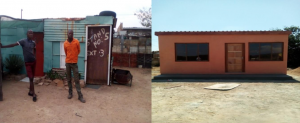
BEFORE AFTER
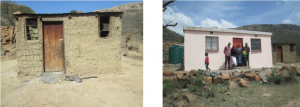
4. SACBC MONITORING & EVALUATION (OVC PROJECTS)
SACBC M&E team supported 50 OVC sites located in the Eastern Cape, Free State, Gauteng, KwaZulu Natal, Limpopo, Mpumalanga, North West and Western Cape. Twenty Two (22) of these sites are new and had been taken on by SACBC in conjunction with PEPFAR partners namely HST, AURUM and Beyond Zero as from October 2015. In the period October 2015 to September 2016, 42 720 OVC and guardians received services. 12 187 received clinical nutrition, 27 628 education support, 22 758 HIV prevention education, 16 361 HIV services, 7 322 household economic strengthening, 13 318 child protection interventions and 33 864 Health Care referrals.
SACBC implemented the full paper based system and the SQL electronic child database system (CDS) at 22 new sites from October 2015. 372 Caregivers were trained on M&E paper based reporting tools.
About 27 M&E staff members were trained on M&E reporting tools including the paper based system, the electronic data system (CDS), management of filing systems and ensuring that data quality assurance processes are in place at sites. All the PEPFAR funded OVC projects are using the SQL database (CDS) to capture and report their data. SACBC M&E staff conducted periodic data quality reviews on sites’ CDS database system to ensure data reliability and integrity.
Visitors from the US Congress, PEFAR officials in South Africa, officials of the Premier’s Office of KZN, UNAIDS officials, staff from Health Systems Trust (HST) and from the Centre for Disease Control (CDC) visited one of our OVC sites in the eThekwini District. The visitors got the opportunity to see how our OVC sites operate and also interviewed OVC beneficiaries who are served by the project and staff members. They were able to understand the challenges and success stories of the program.
Some challenges encountered during the reporting period include a high demand on new program areas like Family Matters! Program (FMP). We attempted to ensure that the programs are implemented. We are working on importing data from our electronic data system (CDS) into ADS. ADS is the new electronic system that SACBC AIDS office is developing in collaboration with ASG Development Solutions. The new system will allow us to align our M&E reporting with the government guidelines, and create a wider spectrum of stakeholders that can receive reports.